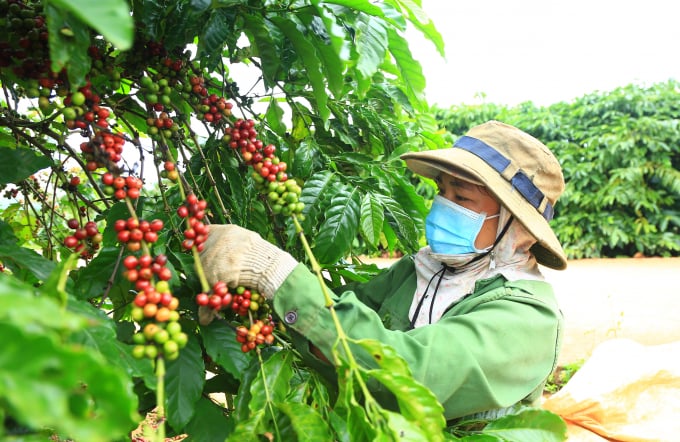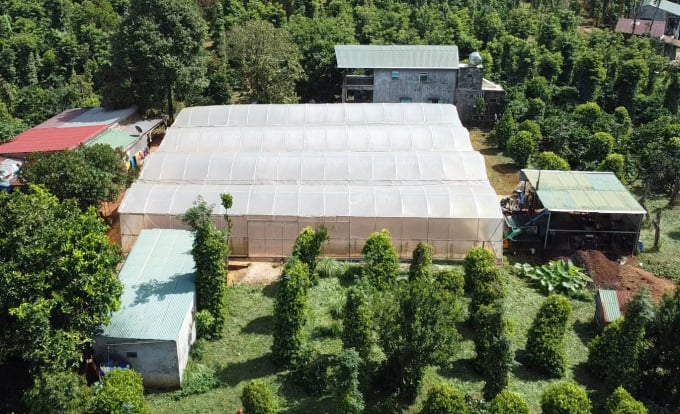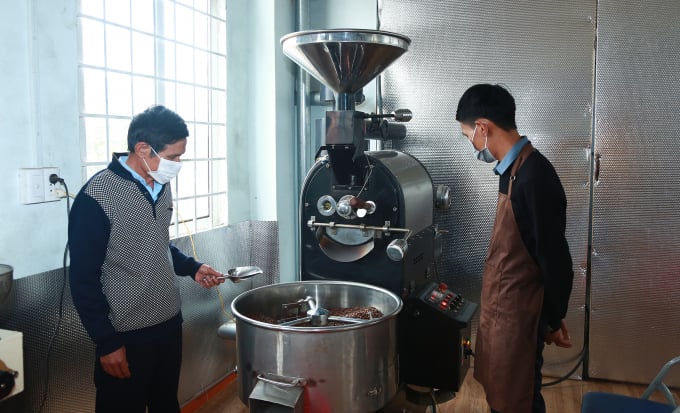June 1, 2025 | 23:00 GMT +7
June 1, 2025 | 23:00 GMT +7
Hotline: 0913.378.918
June 1, 2025 | 23:00 GMT +7
Hotline: 0913.378.918
Mr. Le Ky Su, Head of Agriculture and Rural Development Department of Krong Nang district (Dak Lak), said that the VnSAT project has supported two cooperatives in terms of facilities as well as scientific and technical training on the coffee replanting model. Smallholders have received transfer of seven models of sustainable coffee production and seven models of coffee replanting, and fertilizers, seedlings, science and technology assistance.
Through the process of monitoring local sustainable coffee replanting models, Mr. Su found that the orchards showed clear growth. The survival rate was high, reaching over 90% in the first year.
Localities’ economic efficiency showed signs of improvement particularly when farmers implemented the coffee-avocado intercropping model. Scientific and technical training from the project help farmers grasp the knowledge and perform well the work of creating pots, weeding and temporarily planting for shades in orchards using golden wonder senna trees.

The VnSAT project helps establish sustainable coffee areas in Dak Lak and Dak Nong. Photo: Quang Yen.
The VnSAT project has raised people's awareness of environmental protection in the production area. Farmers now have significantly limited the indiscriminate use of pesticides. And instead of throwing packages and medicine shells out to the environment, they choose the option of centralized processing management.
As stated by Mr. Su, VnSAT organizes training courses and seminars to guide the technical process and raise awareness of people on the effectiveness of applying science and technology in production, changing the mindset and perception of households.
By switching from original experience to following synchronous advanced technical procedures, households can self-account their earnings and expense of their orchards to plan the family’s expenditure in the most effective way.
The success of the models has contributed to improving knowledge and skills for coffee producers. Members attending and visiting the model will actively apply those models to the family's orchard to produce more and more efficiently.

The VnSAT project supports cooperatives and cooperative groups to invest in screen houses for coffee drying. Photo: Quang Yen.
In a similar case, Mr. Phan Hoang Lam, Vice Chairman of Krong Buk District People's Committee (Dak Lak) said that the VnSAT project has helped the locality to shape a sustainable coffee model and increase the value of local coffee products. Most of the replanted coffees are new varieties, and people are thoroughly trained in science and technology so the garden is well-invested.
"Farmers now grow the orchard using new varieties, mainly TR4 and TR9 from the Western Highlands Agro-Forestry Science Institute (WASI) so the yield is 5-6 tons/ha, while traditional coffee only gives 2-3 tons/ha. All the replanting projects are proven to be effective for farmers in the area.
People even receive training particularly in processing procedures thus form sustainable coffee production chains," said Mr. Lam.
In addition to supporting farmers, the project also helps two cooperatives in the area build roads to the production area, drying yard, and warehouse for operation.
Mr. Lam is now more certain upon seeing the benefits the VnSAT project brings to localities: "With the nature of local funding and cooperatives, investing in these facilities may deem difficult. Thanks to the project, the cooperatives have had their foundation established and acquire a clear path for development.”

Some cooperatives receive roasting and processing machines which heightens the quality of coffee as support from the VnSAT project. Photo: Quang Yen.
And in Dak Nong, Mr. Doan Gia Loc, Head of the Agriculture and Rural Development Department of Krong No district, affirmed that the project has helped the locality to form and develop high-quality coffee areas. VnSAT project aids the implementation of sustainable coffee models in three places: Nam Nung, Tan Thanh communes and Dak Mam town.
Up until the present date, coffee-growing areas in Nam Nung commune are heading towards high-tech agriculture in the production area. The VnSAT project also provides scientific and technical training in the direction of sustainable coffee production. Localities are equipped with dryers, color machines, and greenhouses to dry coffee.
The project has given a support fund of over 40 billion VND for local development, mainly investing in infrastructure and roads connecting production areas.
"After the implementation period, it can be seen that the project meets the needs of collective economic development. VnSAT poses as a great help to localities in establishing production link chains thus improving the efficiency and competitiveness of products in terms of deep processing," said Mr. Loc.
Translated by Samuel Pham

(VAN) Several scientists and farmers are experimenting with soil treatment in some key durian-growing regions such as Cai Lay (Tien Giang), Dak Song, Gia Nghia, and Dak R’lap (Dak Nong).
/2025/05/25/4127-3-073637_820.jpg)
(VAN) Thanks to the promotion from an FAO-implemented project, vegetable production in greenhouses in Moc Chau has seen strong development, from 1.5 hectares in 2021 to nearly 50 hectares in 2024.

(VAN) FAO has recently supported USD 140,000 to implement the project 'Risk mitigation human-animal interface risks through disease control initiatives in pig farming.'

(VAN) The People's Committee of Tra Vinh province has approved an adjustment to the investment policy for the Green Hydrogen Plant project, increasing its area to approximately 52.76 hectares.
![Reducing emissions from rice fields: [2] Farmers’ commitment to the soil](https://t.ex-cdn.com/nongnghiepmoitruong.vn/608w/files/news/2025/05/05/dsc08881jpg-nongnghiep-140632.jpg)
(VAN) Clean rice cultivation model in Thuong Tan commune, Bac Tan Uyen district, is assisting local residents in achieving sustainable agriculture by substantially reducing costs, increasing productivity, and protecting the environment.

(VAN) At the conference to disseminate Resolution No. 68, AgriS introduced its digital agricultural ecosystem and reaffirmed its commitment to accompanying the Government in promoting private sector development and sustainable agriculture.

(VAN) 'Blue Ocean - Blue Foods' initiative is designed to restore marine ecosystems and establish sustainable livelihoods for local communities by cultivating a minimum of 1,000 hectares of cottonii seaweed in the first three years.